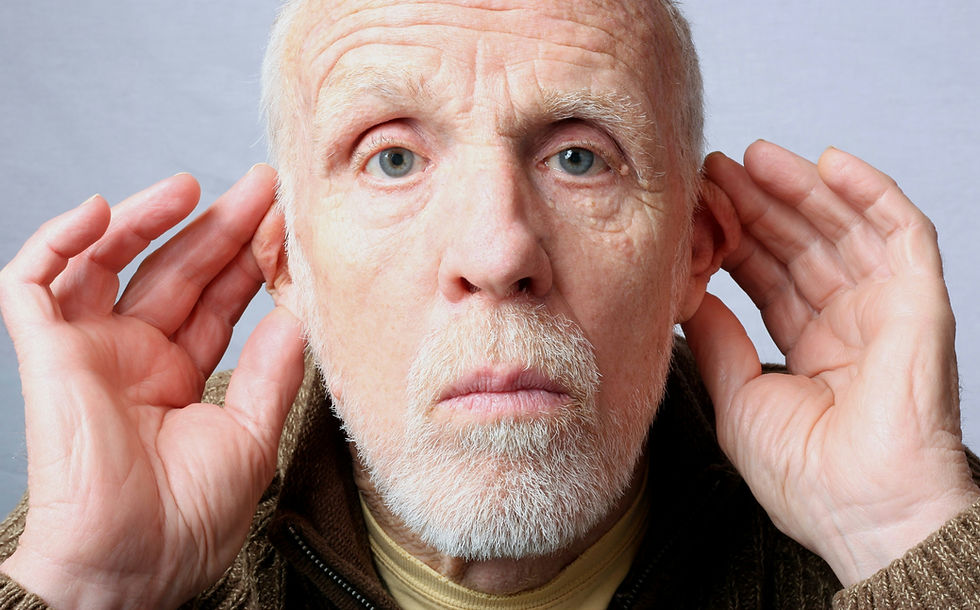There Is a Connection Between Cognitive Decline and Hearing Loss, Journal of the American Medical Association finds
- Dr. Victoria Beene, AuD, CH-TM

- Apr 25, 2025
- 3 min read

This week, JAMA (Journal of the American Medical Association) released an article including their findings on the connection between hearing loss and dementia. We here at Santa Rosa Hearing make it our mission to keep up today on the latest research, and we wanted to share what we’ve read recently that we feel might be beneficial to our community.
This cohort study, part of the Atherosclerosis Risk in Communities Neurocognitive Study (ARIC-NCS), explored how much of new (incident) dementia cases in older adults could be linked to hearing loss. It followed 2,946 community-dwelling participants aged 66 to 90 for up to 8 years, all of whom were free of dementia at the start and had undergone hearing testing. Researchers aimed to estimate what fraction of dementia cases could potentially be prevented if hearing loss were addressed, using both objective (audiometric testing) and subjective (self-reported) measures of hearing loss.
The findings showed that audiometric (clinically tested) hearing loss was significantly associated with later development of dementia. About 32% of dementia cases over the 8-year period could be attributed to audiometric hearing loss, suggesting a large portion of dementia risk in this population might be preventable or delayable through hearing care. Interestingly, self-reported hearing loss did not show a similar association with dementia risk, which points to a potential underestimation when relying on subjective reports alone.
Notably, the risk attributed to hearing loss was even higher among certain groups: those 75 years or older, women, and white adults. The article emphasizes that hearing treatment could be a powerful tool in delaying or preventing dementia on a large scale and recommends more precise hearing assessment methods in future research and care. This comes to no surprise to us, as recent research has been closing the gap between cognition and its relationship to hearing ability.
A few years ago, a meta-analysis, published in Frontiers in Aging Neuroscience, reviewed multiple prospective cohort studies to examine the link between hearing loss and dementia. The findings showed a clear and significant association: individuals with hearing loss had a higher risk of developing dementia, including Alzheimer’s disease. The risk increased with the severity of hearing loss, and the relationship held even after accounting for age and other factors, which is consistent with the findings from the recently published JAMA article mentioned above.
Now, we don’t mean to frighten anyone with this information, but it is important for us to inform the community of the risks associated with unidentified or untreated hearing loss. Virtually all recent research indicates that there is an association between hearing loss and cognitive decline, and it’s imperative that we understand this connection. On the brighter side, there is significant evidence that suggests that when someone is socially engaged in their daily lives, that their cognition can improve!
A 2018 meta-analysis from The Journal of Alzheimer’s Disease (JAD) aggregated the findings from 33 studies comprising 2,300,000 participants. The analysis concluded that individuals with strong social engagement were more likely to avoid cognitive decline than those who were socially isolated. Another 2021 meta-analysis from The Alzheimer’s Association also came to the same conclusion: stronger social connections can help prevent cognition from worsening. The Alzheimer’s Association states in their article that this connection is under-studied, and we expect to see more information about this connection to come to light in the near future.
But nevertheless, our communication with our friends, neighbors, and family, still remains one of the best tools we have to help us become cognitively healthy and engaged with the world around us. We will continue to monitor this topic, and we will continue to post updates here on our Hearing Blog.
Sources



